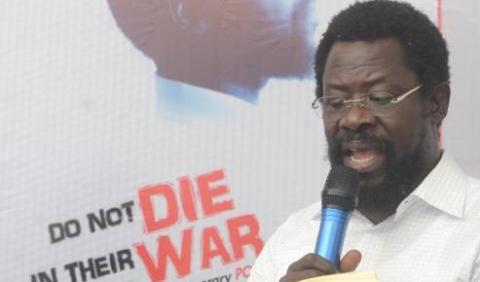
Let the other aspirants in the race be aware, we are not blind to how you might believe that you would profit by the manifestly unjust disqualification of Sherubawon, and your loud silences are well noted: but how do you plan to fight the epidemic of impunity in Nigeria, if you have allowed your ambitions to render you complicit in the introduction of rabid impunity in the NBA itself?
If you have read me for any length of time, or you are somehow acquainted with me, you would not be surprised at my obsession with the Yoruba language and culture, and you would be familiar with my love for our proverbs and idioms. It is one of our proverbial sayings that has had me in deep cogitations for a few days now. It captures the truth of the Nigerian condition succinctly.
Ilu ti ko si ofin, ese o si ni’be. There can be no crime where the law does not exist. The translation I have supplied would suffice for most speakers of the Yoruba language, and they would be completely correct in translating thus, but they would only have succeeded in misleading the persons for whom they had translated the proverb. The Yoruba culture has no place for a land where laws do not exist, and the elders were not referencing anything of the sort. They spoke to something deeper, and I wish to speak to their true intentions, and the true meaning of the proverb.
The Yorubas had evolved a civilisation and culture that had intricate governance systems, and that placed a primacy on law and order. The Yoruba nation was built on hierarchy, the culture was in contact with several other cultures, and it has benefited greatly from its eclectic dynamism. The Yoruba culture assimilated other cultures, evolved over time, and each Yoruba person, knew what the laws were, what the consequences for infractions were, and evolved a highly complex culture of dispute resolution and judicial interventions. The Yoruba culture had a very high regard for rules, laws, and the sanctions that followed infractions and or breaches of the rules and laws.

The Yoruba proverb speaks to something entirely different from what the average translation would offer. The proverb speaks to the tragedy of impunity: it speaks to the impotence of the law, and the resultant insanity that endures in any land, where the law, does not rule. The Yoruba culture has no contextual basis for imagining a society that is capable of functioning without a system of rules, but they were not unfamiliar with the reign of impunity, and the madness that is birthed in that cauldron.
The Nigerian state is the land that the Yoruba proverb speaks of: the land where the law does not rule. The Nigerian state has volumes and tomes of laws, it has a sophisticated court system, the lawyers, servants in the temple of justice, are even hailed as “The Law”. But the closest thing to the dystopian world described in the proverb we’re examining, is the Nigerian state.
The Nigerian state is itself the most prolific of lawbreakers. The government at all levels, routinely breaks the law, and are equally adept at disobeying the increasingly rare orders, that the cowed and compromised judiciary would occasionally issue against the government. The Federal Government is the biggest lawbreaker in Nigeria, but the truth is that every level of government in the Nigerian state, acts with impunity, and so do the agents and functionaries of government.
The law enforcement agencies have even stopped pretending to be interested in the criminal actions and activities of functionaries of government. Mudashiru Obasa is still on the throne as Speaker of the Lagos Assembly, and neither the EFCC, ICPC, or any law enforcement agencies are remotely interested in asking questions of the man. He is not alone. The Nigerian state has evolved into one that operates on two parallel lines; one rule for the rulers, and another for the ruled, impunity has been placed on steroids, and madness has overtaken the land and become normalized.
The impunity that has overtaken Nigeria is as insidious as it is pervasive, and we have become acculturated to evil in a most tragic way. The law has not ceased to exist in our land, it has merely been perverted, and the people have been rendered perverse by the resultant insanity. We have become a people untouched by sanity, and to be sane in Nigeria is to be vulnerable. The unfolding drama in the NBA is more important than most lawyers have realized, and the time has come to pay attention now, before the impunity that has for long hobbled Nigeria, contrive to kill the Nigerian Bar Association.
There is a plot to keep Ademola Adesina Ogunlana out of the coming NBA election. The factional crises leading up to the emergence of the outgoing Chairman of the Ikeja Bar, Dele Oloke, is the fertile soil in which the conspiracy is rooted, and the inglorious role of Femi Falana in the Ikeja show of shame is not unknown. What is at this time unclear, is the extent to which the plotters are prepared to go, in destroying the NBA, in their quest to keep Ogunlana off the ballot. Let the NBA be well advised as to the exact consequences of the evil it is being asked to endorse. If a body of lawyers, would jettison its own rules, and act in a prejudicial manner, from where would it then summon the moral integrity, to presume to speak of justice?
Let the other aspirants in the race be aware, we are not blind to how you might believe that you would profit by the manifestly unjust disqualification of Sherubawon, and your loud silences are well noted: but how do you plan to fight the epidemic of impunity in Nigeria, if you have allowed your ambitions to render you complicit in the introduction of rabid impunity in the NBA itself?
Ilu ti ko si ofin, ese o si ni’be. The Nigerian Bar Association has sufficient rules and laws to guide its actions, and it must be careful to follow these rules scrupulously, if the Bar is not to become as the Nigerian state in which it exists: an unjust, iniquitous, and highly dystopian entity.
Who is afraid of Ogunlana?